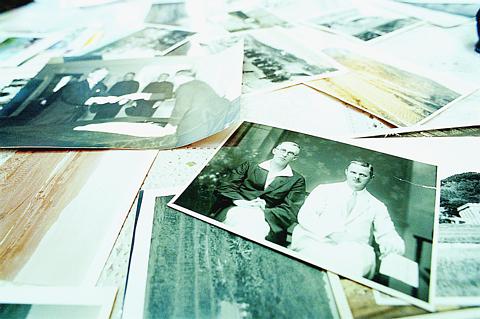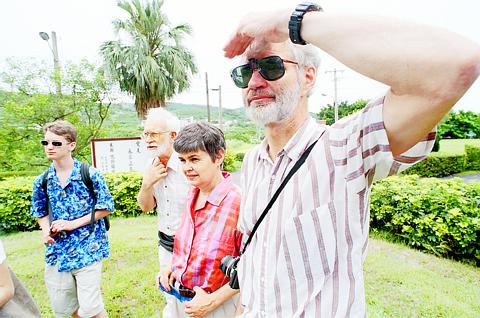For Alan Taylor, a Canadian geophysicist, a recent visit to Pali township in Taipei County on a bright summer day was more than just his first trip to Taiwan. It was a journey rich in historical significance, allowing him to catch a glimpse of the contribution his uncle made to a remote Asian country more than 60 years ago.
Taylor, accompanied by his wife and son, came to Pali, the small town opposite Tamsui across the Tamsui River, to visit the Happy Mount Colony (
The site, which presently accommodates 105 people with various mental disabilities, was founded in 1934 by Dr George Gushue-Taylor (

PHOTO: CHEN CHENG-CHANG, TAIPEI TIMES
"I only met my uncle twice [due to a vast age gap], but the family was in awe of what he did. At a time when nobody [in Canada] really knew where Taiwan was, my uncle chose to settle in an under-developed island in Asia to work on the eradication of leprosy with his medial expertise," said Taylor.
"The only memory I can clearly recall was that when I met him, I asked him to give me a Chinese name. I thought it a really cool thing as a child," he added.
"He was well-known for his frugality. My aunt once told me that she used to receive letters he [my uncle] sent from Taiwan, using recycled envelopes."

PHOTO: CHEN CHENG-CHANG, TAIPEI TIMES
While standing on top of the hill, where the institution was built, Taylor paused to enjoy a bird's eye view of the Tamsui River, attempting to envision what it had looked like when his uncle chose the spot in 1931.
Comparing the view with the dozens of photos he brought along, the landscape appeared intact -- the winding river still runs and the surrounding vegetation is still flourishing. What has changed is that the leprosarium was turned into a center for the mentally disabled in 1971.
"I am sure my uncle would be pleased with its transformation. Lepers and the mentally challenged are similar in the sense that they are both regarded as outcasts in society. Now that leprosy has been eradicated in Taiwan, what they are doing -- lending a helping hand to the mentally disabled -- is equally substantial," said Taylor.
Dr Gushue-Taylor was born on Dec. 5 in 1883 in Ray Roberts, Newfoundland, Canada. He was trained as a physician in London and became a fellow of the Royal College of Physicians and Surgeons -- the highest medical honor at the time.
The doctor's work with leprosy dates back to 1911, when he was assigned by the Presbyterian Church of England to come to Taiwan.
Upon arrival, he saw a case of leprosy and he was deeply moved by the plight of leprosy sufferers. At that time, leprosy patients were rejected by society because their condition was thought to be incurable; they were also considered by superstitious people to be living under a curse.
The doctor refused to accept the idea that leprosy was an incurable disease. To him it was just a disease, and one that could be cured. His conviction prompted his research on leprosy and on measures of treatment for the disease.
In Taipei, the doctor opened the first special out-patient clinic for lepers in 1925 in connection with the Mackay Memorial Hospital (馬偕醫院), where he served as superintendent from 1923 to 1936. But the site soon became overcrowded. At the time, the doctor estimated the total number of lepers in Taiwan to be more than 4,000, and possibly even double that number.
Aware of the prevalence of the disease, the doctor realized that out-patient clinics were not sufficient to deal with the problem and decided to plan for a residential colony where patients could be kept, treated and studied under daily professional care.
In 1931, with the aid of Taiwanese Pastor Keh (
The most important thing in the doctor's mind was an adequate source of water. The colony, with an area of nearly 40 hectares, was officially opened on March 30, 1934 with the assistance of another missionary, Dr Hugh MacMillan.
Gushue-Taylor and his wife, Margery, who worked as the superintendent of nurses, were the founders of relief work for those suffering from leprosy in Taiwan.
"The study of leprosy and its treatment were officially initiated by the doctor during his stay at the colony from 1934 to 1940," said Johann Chao (
Gushue-Taylor came across as a very stern figure, diligent and devoted to his job. He was devoted to his patients, but at the same time very demanding, Chao said, recalling his contact with the doctor in the early 1950s.
"Dr and Mrs Gushue-Taylor did not have any children because Mrs Gushue-Taylor had uterine cancer. It probably was a source of sadness for them; however, it was never a major regret because they had no perception that the primary purpose for marriage was to produce offspring," said Chao.
"What was more meaningful [for them] was to follow the doctrine of Christianity to help others. He therefore chose to better the life of human beings by making use of his medical prowess."
His never shied away from his resolution to carry out his mission to eradicate leprosy, despite the tremendous obstacles faced by him. "It was his religious upbringing that enabled him to sustain his determination to fight against leprosy, because he held the conviction that to `cleanse the lepers' was a calling sent to him from his master -- Jesus Christ," Alan Taylor said.
The doctor carried on with his mission of ridding the island of leprosy until 1940. During World War II, he was forced to leave Taiwan under accusation of being a secret agent by the Japanese army.
Reports show that nearly 1000 leprosy patients were cured at the Happy Mount Colony after it was established.
The doctor returned to Taiwan after World War II for the first time in 1952 and held discussions with the China Inland Mission, asking for them to provide medical assistance to the Happy Mount Colony.
In 1953, he came back to Taiwan again to help resolve a dispute with the government concerning the ownership of the property.
The doctor died of acute peritonitis on April 23, 1954 at the age of 72, while traveling back to Canada by boat. Historical documents record that before he died he told the boat's crew that he wanted his remains laid to rest at Happy Mount, because Formosa was the land where his career and spirit were closely connected.
The doctor's undertaking regarding the treatment of leprosy, fortunately, was not interrupted after his death. Dr Hugh MacMillan carried on his mission by founding the TLRA in 1955 to assist those afflicted with leprosy nationwide.
"The Doctor's death was like a kernel of wheat that fell into the furrows of the earth. His death has produced many new wheat kernels -- a plentiful harvest of new lives," according to an excerpt from an essay, written by Chao, in commemoration of the 50th anniversary of Happy Mount Colony.

US President Donald Trump yesterday announced sweeping "reciprocal tariffs" on US trading partners, including a 32 percent tax on goods from Taiwan that is set to take effect on Wednesday. At a Rose Garden event, Trump declared a 10 percent baseline tax on imports from all countries, with the White House saying it would take effect on Saturday. Countries with larger trade surpluses with the US would face higher duties beginning on Wednesday, including Taiwan (32 percent), China (34 percent), Japan (24 percent), South Korea (25 percent), Vietnam (46 percent) and Thailand (36 percent). Canada and Mexico, the two largest US trading

China's military today said it began joint army, navy and rocket force exercises around Taiwan to "serve as a stern warning and powerful deterrent against Taiwanese independence," calling President William Lai (賴清德) a "parasite." The exercises come after Lai called Beijing a "foreign hostile force" last month. More than 10 Chinese military ships approached close to Taiwan's 24 nautical mile (44.4km) contiguous zone this morning and Taiwan sent its own warships to respond, two senior Taiwanese officials said. Taiwan has not yet detected any live fire by the Chinese military so far, one of the officials said. The drills took place after US Secretary

CHIP EXCEPTION: An official said that an exception for Taiwanese semiconductors would have a limited effect, as most are packaged in third nations before being sold The Executive Yuan yesterday decried US President Donald Trump’s 32 percent tariff on Taiwanese goods announced hours earlier as “unfair,” saying it would lodge a representation with Washington. The Cabinet in a statement described the pledged US tariffs, expected to take effect on Wednesday next week, as “deeply unreasonable” and “highly regrettable.” Cabinet spokeswoman Michelle Lee (李慧芝) said that the government would “lodge a solemn representation” with the US Trade Representative and continue negotiating with Washington to “ensure the interests of our nation and industries.” Trump at a news conference in Washington on Wednesday announced a 10 percent baseline tariff on most goods

THUGGISH BEHAVIOR: Encouraging people to report independence supporters is another intimidation tactic that threatens cross-strait peace, the state department said China setting up an online system for reporting “Taiwanese independence” advocates is an “irresponsible and reprehensible” act, a US government spokesperson said on Friday. “China’s call for private individuals to report on alleged ‘persecution or suppression’ by supposed ‘Taiwan independence henchmen and accomplices’ is irresponsible and reprehensible,” an unnamed US Department of State spokesperson told the Central News Agency in an e-mail. The move is part of Beijing’s “intimidation campaign” against Taiwan and its supporters, and is “threatening free speech around the world, destabilizing the Indo-Pacific region, and deliberately eroding the cross-strait status quo,” the spokesperson said. The Chinese Communist Party’s “threats